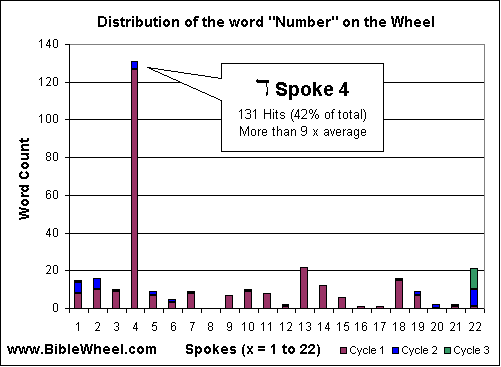Numbers: Following God in the Wilderness
And the LORD spake unto Moses in the wilderness of Sinai, in the tabernacle of the
congregation, on the first day of the second month, in the second year after they were come out
of the land of Egypt, saying, Take ye the sum of all the congregation of the children of Israel,
after their families, by the house of their fathers, with the number of their names, every male
by their polls; From twenty years old and upward, all that are able to go forth to war in
Israel: thou and Aaron shall number them by their armies.
Numbers 1:1ff (Spoke 4, Cycle 1)
The traditional Hebrew names of the first five Books are all taken from words found in
their first verses. Case in point, the Fourth Book is called במדבר (B'Midbar, In the wilderness),
taken from the first verse in Hebrew. That this is the apt title for the book is evident from the distribution
of the phrase "in the wilderness" throughout the Bible:

It is particularly striking to behold how Cycle 1 (maroon bars) and Cycle 2 (blue bars) tend to rise and
fall together. This gives rise to a relatively large value of .55 for the correlation coefficient between these two
distributions. Cycle 3 does not play a role in this correlation.
But the traditional Christian name is also relevant
because it reflects the peculiar dominance of the word "number" in the Fourth Book where it appears 127 times,
accounting for 40% of all occurrences in the Bible, as seen in this graph:

This means that the distribution of both the English and the Hebrew names of
Book 4 are maximized on Spoke 4.
Structure of the Book of Numbers
The Book of Numbers divides into three dominant sections:
- PREPARATION FOR THE JOURNEY INTO THE PROMISED LAND (Chapters 1–10): These ten chapters record the numbering of
the tribes, the layout of the foursquare camp, and various laws, statutes, and Divine commands.
- REBELLION IN THE WILDERNESS (Chapters 11–15): The rebellion began with murmurings against God
and sedition against Moses. It culminated in blatant refusal to obey the Lord when He commanded them to
enter the Promised Land. This is the pivotal section that gives the reason for the forty years of wandering
(see A Day for a Year, BW book pg 176).
- DEATH IN THE WILDERNESS: THE WANDERINGS (Chapters 16–36): This records the sad, sad result of their rebellion
and unbelief. God condemned them to forty years of wandering until all the rebels died out. It is an image of
the death of the lust of the flesh that must take place in every Christian walk. It presents the option of
obedience that leads to the promised rest of God versus the extended and extremely painful slow death of
the fleshly lust in the soul that resists God.
|



